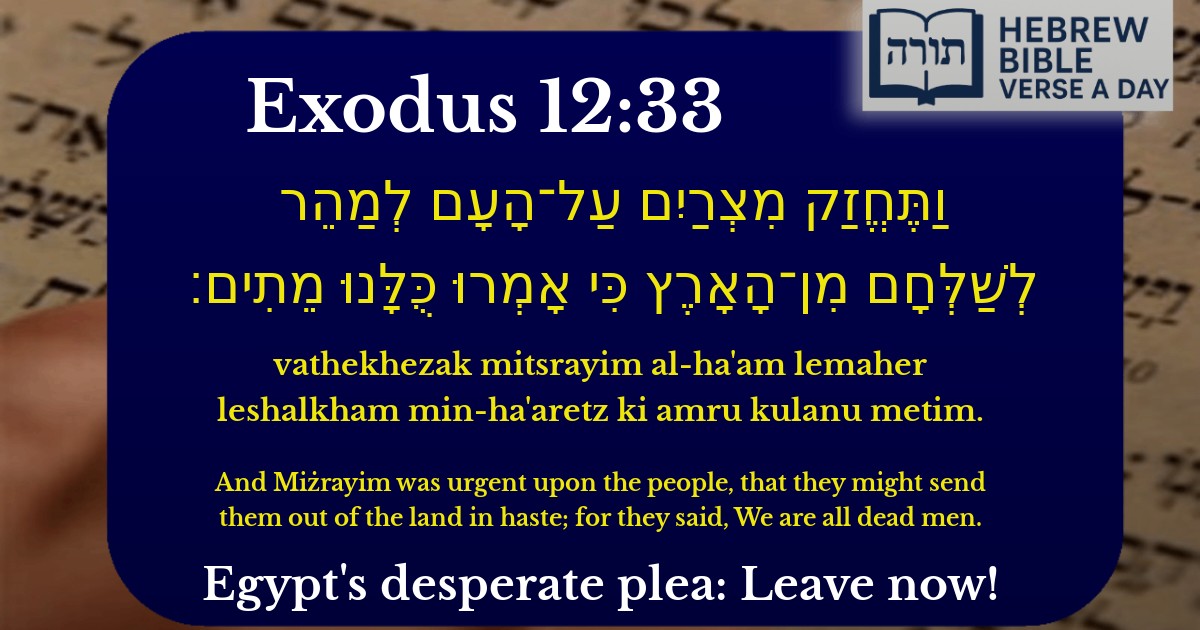Join Our Newsletter To Be Informed When New Videos Are Posted
Join the thousands of fellow Studends who rely on our videos to learn how to read the bible in Hebrew for free!
Hebrew Text
וַתֶּחֱזַק מִצְרַיִם עַל־הָעָם לְמַהֵר לְשַׁלְּחָם מִן־הָאָרֶץ כִּי אָמְרוּ כֻּלָּנוּ מֵתִים׃
English Translation
And Miżrayim was urgent upon the people, that they might send them out of the land in haste; for they said, We are all dead men.
Transliteration
Vathekhezak mitsrayim al-ha'am lemaher leshalkham min-ha'aretz ki amru kulanu metim.
Hebrew Leining Text
וַתֶּחֱזַ֤ק מִצְרַ֙יִם֙ עַל־הָעָ֔ם לְמַהֵ֖ר לְשַׁלְּחָ֣ם מִן־הָאָ֑רֶץ כִּ֥י אָמְר֖וּ כֻּלָּ֥נוּ מֵתִֽים׃
וַתֶּחֱזַ֤ק מִצְרַ֙יִם֙ עַל־הָעָ֔ם לְמַהֵ֖ר לְשַׁלְּחָ֣ם מִן־הָאָ֑רֶץ כִּ֥י אָמְר֖וּ כֻּלָּ֥נוּ מֵתִֽים׃
🎵 Listen to leining
Parasha Commentary
📚 Talmud Citations
This verse is not quoted in the Talmud.


Understanding the Verse in Context
The verse (Shemot 12:33) describes the urgency with which the Egyptians compelled the Israelites to leave Egypt after the final plague, the death of the firstborn. The Egyptians feared further devastation and declared, "We are all dead men," expressing their terror that they would perish entirely if the Israelites remained.
Rashi's Commentary
Rashi explains that the Egyptians "were urgent upon the people"—meaning they pressured the Israelites to leave quickly. He notes that the Egyptians feared additional plagues or retribution if the Israelites delayed. The phrase "for they said, We are all dead men" reflects their belief that they would face complete annihilation if the Israelites stayed any longer.
Ibn Ezra's Perspective
Ibn Ezra emphasizes that the Egyptians' fear was not just of further plagues but also of divine retribution. He suggests that their statement, "We are all dead men," was a realization that they had no power against Hashem's will, and their survival depended on the Israelites' swift departure.
Midrashic Interpretation
The Midrash (Shemot Rabbah 18:10) elaborates that the Egyptians were not merely afraid of death but also of the Israelites taking revenge for their enslavement. They feared that the Israelites, now emboldened by divine intervention, might turn against them. This explains their urgency in sending them away.
Rambam's Insight
Rambam (Maimonides) in Moreh Nevuchim (Guide for the Perplexed) discusses how the plagues demonstrated Hashem's absolute control over nature and human affairs. The Egyptians' declaration, "We are all dead men," was an acknowledgment of their helplessness before divine judgment.
Key Lessons from the Verse